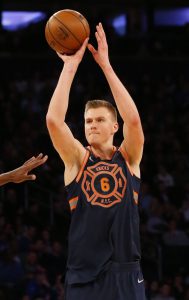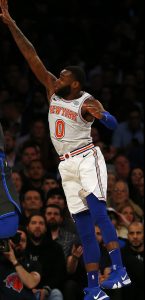For fans of teams like the Knicks, Suns, Cavaliers, and Bulls, the bottom of the NBA’s standings are of particular interest this season because of the effect they’ll have on the first-round order of the 2019 NBA draft.
Of course, those reverse standings will also dictate the order of the draft’s second round, and an early second round pick can nearly as valuable as a first rounder.
So, while traded first round selections like the one the Raptors sent the Spurs or the one the Nuggets traded to the Nets may have received more attention, it’s worth taking a closer look at some traded 2019 second rounders that now project to be valuable picks.
[RELATED: Traded Second Round Picks For 2019 NBA Draft]
Here are five of those picks:
1. Knicks’ pick traded to Nets
The Knicks originally sent their 2019 second round pick to Philadelphia in a 2014 salary dump involving Travis Outlaw. The Sixers subsequently sent it to to the Nets, along with Jahlil Okafor and Nik Stauskas, last season for Trevor Booker.
Now, that pick looks pretty intriguing — if the season ended today, it would be the No. 32 overall selection.
2. Cavaliers’ pick traded to Sixers (or Kings)
Cleveland initially surrendered this pick in a 2015 trade that netted them Iman Shumpert and J.R. Smith, and it has since changed hands multiple times and become tied up in a convoluted series of swaps — the Sixers will receive it as a result of this month’s Markelle Fultz trade, assuming it’s more favorable than the Orlando, Houston, and Portland second rounders, which seems like a safe bet.
While this selection projects to be No. 33 overall, the Cavaliers probably feel it was worth it to give it up years ago, since Shumpert and Smith played roles on 2016’s title team.
3. Bulls’ pick traded to Sixers
The Bulls attached this pick to Jose Calderon in a salary-dump deal during the 2016 offseason, trading it to the Lakers. L.A., in turn, sent it to Philadelphia as part of a draft-day deal this past summer — it was the price to acquire Isaac Bonga.
It now projects to be the No. 34 pick this year, which could give the Sixers two of the first four selections in the second round.
4. Grizzlies’ pick traded to Bulls
It may seem hard to believe now, but less than a month and a half ago, the Grizzlies were still in buying mode, sending a pair of second round picks – including their 2019 selection – to Chicago for Justin Holiday.
Memphis has slumped badly since then, and that pick would be No. 36 overall if the season ended today. For the Bulls, getting this selection helps make up for having moved their own second rounder.
5. Wizards’ pick traded to Hornets or Nuggets
The Wizards first dealt this pick on draft night in 2015 in a trade that allowed them to move up to select Kelly Oubre. The Hawks, who received it in that deal, flipped it to Denver in a 2017 three-way trade involving Danilo Gallinari and Jamal Crawford.
Here’s where it gets complicated: When they moved up two spots in the 2018 draft to nab Jarred Vanderbilt, the Nuggets agreed to give the Magic the least favorable of Denver’s own 2019 second round pick and that Wizards’ second rounder they got from Atlanta. Orlando then sent the least favorable of those two picks to Charlotte in a deal involving Timofey Mozgov, Jerian Grant, and Bismack Biyombo.
But the Nuggets had sent their own top-55 protected second rounder to New Orleans – by way of Milwaukee – in a separate deal, meaning the “least favorable” pick sent to Charlotte via Orlando had to account for those conditions too. So, if Denver’s pick falls between 56-60, the Pelicans will acquire it and the Hornets will instead get the more favorable pick, Washington’s second rounder. Got all that?
For now, the Nuggets’ second rounder projects to be No. 57 — in that scenario, the Pelicans would receive it and the Hornets would receive Washington’s pick, which would be No. 37. But if Denver’s pick ends up at, say, No. 54, Orlando will get it, New Orleans won’t get anything, and the Nuggets will get the Wizards’ selection.
Information from RealGM was used in the creation of this post.
 A top-14 pick who does not meet the starter criteria will receive a qualifying offer equal to the amount the 15th overall pick would receive if he signed for 120% of the rookie scale.
A top-14 pick who does not meet the starter criteria will receive a qualifying offer equal to the amount the 15th overall pick would receive if he signed for 120% of the rookie scale.
